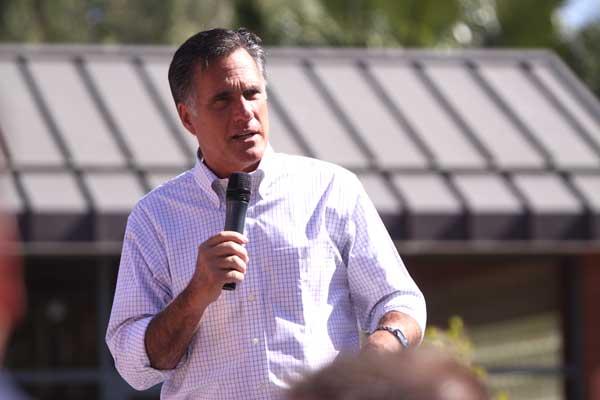Mitt Romney clinched the GOP presidential nomination on May 28, becoming the first Mormon selected by a major political party. But will his barrier-breaking faith be a boon or bane to his White House campaign?
The answer to that question could presage the next president, and two studies published in May come to contradictory conclusions.
In both studies people were given information about Romney and his Church of Jesus Christ of Latter-day Saints, then asked whether they would be more or less likely to vote for him.
The first study, produced by three prominent political scientists, including two Mormons, finds that Romney’s religion hampered his 2008 presidential run, and may do so again this year.
But a second, conducted by the Washington-based nonpartisan Brookings Institution, calls such concerns “overblown” and suggests that Romney’s Mormonism may actually help him court conservative voters.
So what gives?
This much seems clear: Since 1967, nearly one in five Americans have consistently told Gallup pollsters that they would not vote for a Mormon presidential candidate.
Meanwhile, more Americans are becoming aware of Romney’s religion: 48 percent know that he’s a Mormon, up from 39 percent last November, according to the Pew Research Center.
Relentless media attention -- exploring everything from Mormon undergarments to the church’s polygamist past -- has introduced Romney’s faith to the wider public. The spotlight will only intensify now that Romney has secured the GOP nomination.
But few Americans are personally well-acquainted with a Mormon, according political scientists David Campbell of the University of Notre Dame, John Green of the University of Akron and J. Quin Monson of Brigham Young University. Just 14 percent of Americans have a Mormon family member or close friend.
That could present obstacles for Romney, the political scientists argue in their paper, “The Stained Glass Ceiling: Social Contact and Mitt Romney’s ‘Religion Problem.’”
Mormons are no longer persecuted, as they were during the late 1800s, but their beliefs and proselytizing remain unpopular among many Americans, the scholars say. In addition, Mormons are geographically isolated in western states and socially insular, often marrying and making friends within the church.
In other words, they have built few social “bridges” to non-Mormons, with consequences for Romney's campaign.
People who know a Mormon well were less likely to be dissuaded from supporting Romney by hearing negative information about his church, the scholars found. People with no personal exposure to Mormons (46 percent) were swayed by both positive and negative facts about the faith. And people who know a Mormon only in passing (40 percent) were more likely to be influenced by negative than positive depictions of the faith.
“It’s akin to having a Mormon colleague at work, and all you know about him is that he doesn’t go to happy hour after work with the rest of the office, and you think that’s kind of odd,” Monson said. When fed a negative nugget of information about Mormonism, it confirms a sense that something is amiss about Romney, said Monson, a Latter-day Saint himself.
The study was conducted in early 2008, during Romney's first White House run. The scholars say it may also foretell his future.
“Given that the general perception of Mormons has not changed since 2008 and that there is no reason to think that Americans became more likely to have Mormons as close friends or family members since 2008,” the scholars write, “our results suggest that Romney’s religion will remain a potential political stumbling block.”
The Brookings study, however, found that a lot had changed in four years.
Matthew Chingos, a Brookings fellow, and Michael Henderson, a political scientist at Mississippi University, argue that even evangelicals who had rejected Romney during the 2012 primary now solidly support him.
“White evangelicals do not abandon Romney even when differences between their beliefs and his are emphasized,” the study says. “Thus it appears that the concerns among the campaign watchers about Romney’s religion are misplaced.”
Chingos and Henderson acknowledge that their results should not be considered definitive, because they were not based on a nationally representative sample.
But it’s well-known that partisans develop more favorable impressions of their party’s nominee as the campaign continues, Chingos and Henderson note.
And evangelicals and Romney are now united by a common enemy: President Obama. In the 2008 study, Romney was competing against social conservatives and fellow Republicans.
“The clear choice in November is between a president with whom they disagree, or Romney, who is Mormon, which they - in theory - don’t like,” Chingos said. In the end, theory yields to political reality, Chingos said.
Critics of the Brookings study say that respondents were given relatively tame facts about Mormonism, while American voters will likely hear far more contentious rhetoric during the campaign.
Joanna Brooks, a senior correspondent at the online magazine Religion Dispatches, said that no one knows how Romney’s faith will affect his White House campaign. The "Book of Mormon Girl" author suspects that the recent studies say as much about Americans as they do about her church.
“One way to conceive of the `Mormon moment’ that we are living through right now is to look at it as a verdict on Mormons’ respectability and favorability among Americans,” Brooks said. “But another way to see it is as a gauge of how very little Americans know about the 6 million Mormons who live in their midst.”
Got something to say about what you're reading? We value your feedback!
